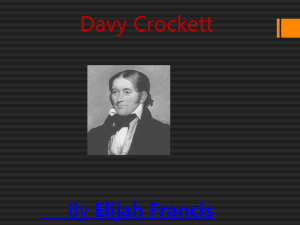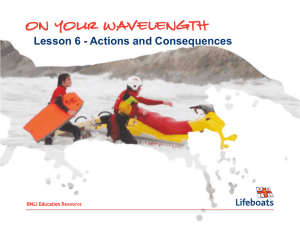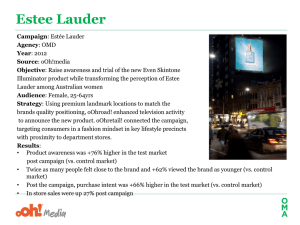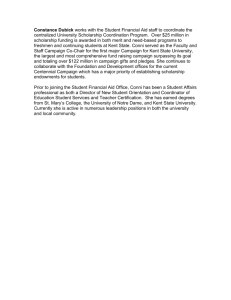The Future of Politics in our hands - Politics and Government| Illinois
advertisement
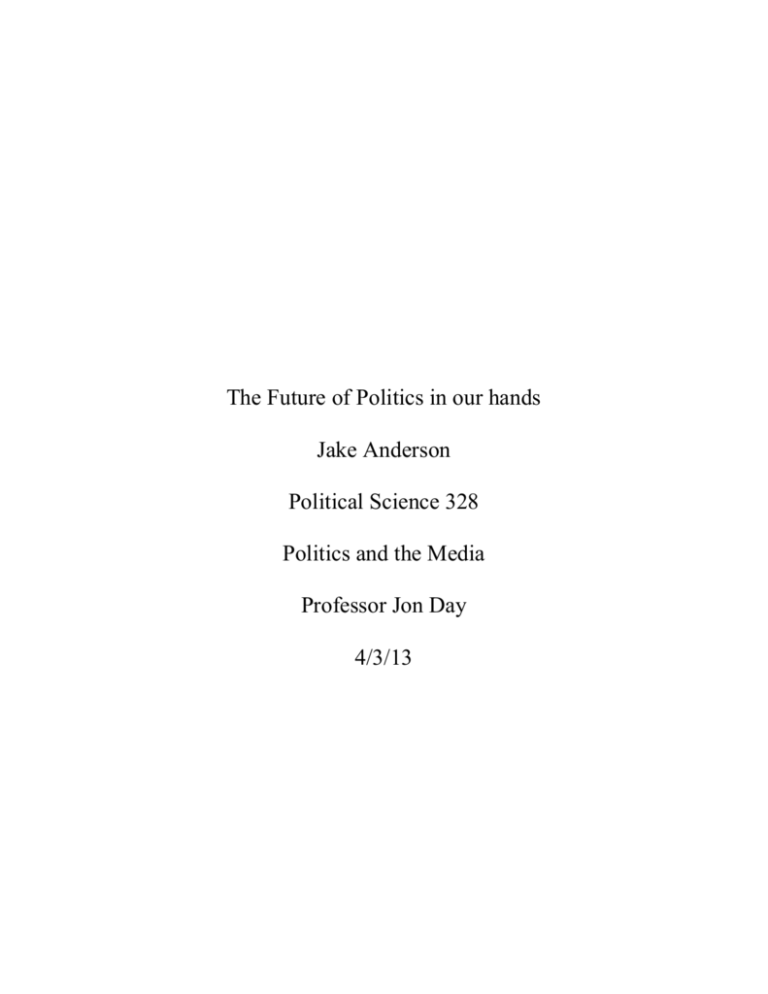
The Future of Politics in our hands Jake Anderson Political Science 328 Politics and the Media Professor Jon Day 4/3/13 Jake Anderson 2/25/13 Jon Day Pols 328 The Future of Politics in our Hand It is hard to imagine a world where if you want to know what Michael Jordan’s career stats are that you can just hop on a computer, tablet or smartphone and “Google” your question, and instantly be answered. Roughly twenty years ago though in fact this was not possible. The commercialization of the Internet in the 1990s changed our world forever. This new technology not only connected our world like never before which led to the globalization we know today, but also improved our defenses, banking, social life, business, entertainment and the list continues. The Internet has come along way from the dreaded dial up to current modems and 4 G mobile-to-mobile moving at lightning fast speeds. One area, which has been greatly effected by the implementation of the Internet, is the news world. The Internet became a new medium in a business, which hadn’t seen something new since the television. With news websites available 24/7, social media sites constantly updating, along with mobile apps the competition has gotten fierce for newspapers, radio and television. Within this competition one realm of news significantly affected would be that of politics. For one thing political news is always at the forefront whether it is elections, foreign affairs, legislation, and scandals. If a politician is doing something the news is not far behind especially if it is bad. I believe that political news and the politicians themselves have had to adapt to this new medium of news. Which is why I will be researching how the Internet has influenced political news, by investigating political news formed by the Internet historically. Furthermore I will analyze how politicians have evolved in handling the Internet while campaigning and in office. Finally 2 Jake Anderson 2/25/13 Jon Day Pols 328 by reviewing the current forms of Internet news I hope to determine whether there is a new medium for how we will get our political news in the future. Internet History And Moments in Politics While the actual term “Internet” was first used in 1982 the first time the idea of multiple networks being connected across large areas was in 1969. With connection between four U.S. Universities it provided a communications network linking the country in the event that a military attack destroyed conventional communications systems. The internet as we know it though started to form between 1989-1993, where the concepts of hyperlinks, navigation systems and index were created to provide convenience. In 1994 politics and the Internet became acquainted when the White House launched, www.whitehouse.gov, its website. Original commerce sites are founded and mass marketing campaigns are launched via email, imprinting the term “spamming” to the Internet language. The next few years saw the Vatican website arise along with household name companies like Google, java and AOL. In 1997 the GOP created an Internet forum called FreeRepublic coincidentally the same year Weblog (blog) was first coined. This creation of forums laid the way for all political groups to let their voice not only be heard to a vast audience, but along with the weblog allowed for the people to be heard too. The Internet ball was rolling, fast and in 1998 there were approximately 45 million Internet users. By the beginning of 1999 there were 150 million users, more than 50% from the U.S. This same year witnessed political news like never before when the Clinton/Lewinsky scandal broke first on the drudge report, a glimpse at how the majority of scandals would be broken via the Internet. In reaction to this scandal MoveOn was 3 Jake Anderson 2/25/13 Jon Day Pols 328 created for progressives as a political community available online. Shockingly in 2000 the Internet ball burst as investment capital dried up and the Nasdaq stock index plummeted triggering the initial public offering (IPO) window to crash and many dotcoms to close their sites. As a result America Online bought Time Warner for $16 billion, which is the biggest merger of all time. Though the crash hurt the internets image it was quickly revived with the advent of E-commerce in the early 2000’s, since then online shopping has become a huge market. The company, which may have prospered most from E-commerce, may be Apple who in 2003 initiated ITunes music store, which allowed users to buy songs for 99 cents each. Political news on the internet was increasing by 2000, but the real change came when the politicians realized the power of the internet on campaigns. The 2000 election year saw this when the Bush campaign made groundbreaking use of phone bank technology for get-out-the-vote initiatives, a common tactic today, we know this technology as automated messages. In Steven Davy’s article How Technology Changed American Politics in the Internet Age he recalls the 2000 election: That campaign year was notable for the use of online ads. A study from AdRelevance, Nielsen Online's service that tracks advertising activity, was reported in USA Today on October 30, 2000. It suggested that "Republicans used a more 'targeted' approach, while Democrats relied on a 'broad reach' effort. The Republicans, for example, ran more than 20 unique banners on 35 sites...the Democrats achieved all their exposure with a single banner ad on Yahoo." (Davy) 4 Jake Anderson 2/25/13 Jon Day Pols 328 This lay way to what we know today as mass online advertising done by both parties aiming at as many voters as possible. Davy states “The AdRelevance study also reported that Republicans used online marketing tools to build a database of 700,000 names” (Davy). With these new tactics available on the internet 2004 saw campaigns go to new heights. One example in particular was presidential hopeful Howard Dean and his campaign's use of Meetup to empower supporters to self-organize, Davy said according to Wired magazine “There were 11 Dean meetings around the country organized through Meetup. By late fall, there were more than 800 monthly meetings on the calendar” (Davy). This showed the power the Internet had for the voters to organize. Similarly the Democratic Party launched the Internet fundraising group ActBlue, along with the Rock the Vote campaign that estimated 1.2 million votes. This campaign also included a partnership with Motorola that launched a large-scale mobile political project which enabled people to sign up to receive information on their mobile devices. This project a possible foreshadow of how so many citizens receive their news through their phones today. As the campaigns continued to adapt to the Internets broadening reach, 2005 changed everything with YouTube as a site, which allowed citizens to post their own videos from campaign events, including politicians making faux pas. The Huffington Post a news website was also created which began the trend of news and blogs available in the same area. It seems in the Internets history of political news the stakes were always raised the next major election year and with the addition of social media websites they were never higher. Social media sites like Facebook and Twitter both through their hands in the ring of campaign news and they brought a lot considering their constituency amounts. Possibly the biggest innovation to political news came on July 23rd in 5 Jake Anderson 2/25/13 Jon Day Pols 328 Charleston S.C. when CNN held the first YouTube debate for the Democrats followed by the GOP Nov 28th. Possibly a vision of the future this was one of the first times television and Internet were conjoined forming a new style medium. On the subject of new ideas Davy states “In October 2008, the Obama campaign released its free Obama08 app, which organized a person's iPhone contacts to enable supporters to call friends located in important electoral districts among other features” (Davy). This is a nice example of how far the Internets reach has come with news ten years prior the party’s were creating basic online groups, but now they are able to create apps for the mobile phone to spread their word. From 2008 to the present news has continued to evolve on the Internet and social media continues to grow. With many politicians owning twitter accounts, there has never been such a connection between citizens and politicians since the days of FDR’s fireside chats. YouTube has also expanded further allowing for any political event or speech to be seen if missed on television. But has this drastic change in campaign strategy been for nothing or do more citizens look to the Internet for their news? In Aaron Smith’s The Internet and Campaign he analyzes how Americans gain their campaign news he states “One-Quarter of Americans use the internet as a major source of campaign news in 2010 up from seven percent in 2002” (Smith). This statistic displays that these campaign changes have made a significant difference in how voters get their news. This also displays that the power of the news on the Internet is only just beginning, to better gage the power I will next discuss the different forms of news available on the Internet. 6 Jake Anderson 2/25/13 Jon Day Pols 328 Forms of Internet News The first major form of news on the Internet would be actual news company websites such as CNN.com, MSNBC.com, and Fox.com with no surprise these sites all resemble the same properties they display on television. As such they have video clips, sound bites, photos that would be shown on TV, available on the site. These sites will often also contain more stories written by their own correspondents, which may not reach the TV. Many of these news companies have even spread to YouTube creating their own channels. One of the benefits of these news sites, which have helped their growth in popularity, is the user having the control with what news they want to read about. With all the personalization, dramatization, fragmentation and overbearing networks. It has become difficult for TV viewers to become fully immersed or knowledgeable on the stories. With topics jumping from one intense topic after another it is hard for viewers to fully grasp what’s going on. It is like going through a library and only reading the back of the books and expecting to know everything that happens in the story. While when using these news sites users are able to choose which story they want to read and for how long. Other availability’s that users enjoy have developed from the news sites borrowing ideas from the other forms of Internet news blogs and social media. A blog is a discussion or information on an Internet site, which begins with a basic title or “post” and proceeds with the most recent post at the top going chronologically downward. Blogs compared to the other two forms has always had a negative stigma in the news world. Perhaps because of the openness of it, and lack of professionals involved. This animosity lessened after “Rathergate” which involved CBS displaying documents on President Bush’s military record, which the bloggers declared to be false and posted evidence proving their claim. 7 Jake Anderson 2/25/13 Jon Day Pols 328 Many bloggers view this scandal as the advent of blogs' acceptance by the mass media, both as a news source and opinion and as means of applying political pressure. A social media or networking service is an online service, platform, or site that focuses on facilitating the building of social networks or social relations among people who, for example, share interests, activities, backgrounds, or real-life connections. Most of these networks are based online and allow users to interact via email, instant messaging. This type of Internet news has really only begun to develop with Twitter and Facebook as discussed previously continuing to take a more active role in political affairs. Perhaps social medias greatest effect on political news would be the revolution in Egypt, in his article The faces of Egypt’s Revolution 2.0 John Sutter reports “In the Egyptian revolution, Facebook and Twitter both played a pivotal role in keeping people connected to the revolt. Egyptian activists have credited social networking sites with providing a platform for planning protest and sharing news from Tahrir Square in real time. By presenting a platform for thousands of people to instantaneously share videos of mainly events featuring brutality, social networking proves to be a vital tool in revolutions” (Sutter). It seems that these different forms of media each provide different aspects. The major news websites provide stories and all background information needed the blogs provide a voice for the citizens and a place for the politicians to hear them, and social media deliver the arena for these citizens to connect on issues or to support their candidate. This explains why news site have now begun to adapt blogs to their own website along with more connectivity to others a la social media. These types of innovations may reveal insight to what the future holds in Internet news. 8 Jake Anderson 2/25/13 Jon Day Pols 328 Future of News It is hard to imagine a technology that will come to surpass the Internet in our lifetime, while it will keep getting faster and more available. Along with that mobile phones will continue to become the source of more and more peoples news. They are versatile mobile and now have screens with better resolution then some televisions. In saying this I do not believe however that there are not new ways in which the Internet will provide news. I believe the three forms of Internet news will consolidate into a single interface which blends the three. The difference is this new medium will not be dominated by one of the three forms of Internet news since instead it will fully immerse all three. Meaning that these sites will provide news stories, which you can read, but also comment on, connect with others who are reading the article and thereby forming a community. This connectivity will provide the news sites with a better idea of what their viewers want along with possibly forcing news companies to provide more depth in their stories. In all of my research I can confidently say that the news and Internet have been connected since day one and this will only continue. News is something, which gains power by notoriety, and the Internet is the best source to do that. This new type of medium I have come up with, which may already be in the development rooms as I write this, will change the political news the same way. As I saw in my research as the Internet evolved political news evolved with it, from blog to breaking scandals to live YouTube debates. Politicians will not only be able to see the stories which are being covered, but also read citizens opinions on them and with the social media aspect, politicians can even connect with people. This could establish a more efficient nation in that the needs voiced by the people will be heard and acted on. In all I did not expect the internet and political 9 Jake Anderson 2/25/13 Jon Day Pols 328 news to have this much history in only a twenty year period and while I do believe my prediction of a combined interface of all internet news forms will be our new medium. One thing I do know is this it is only the beginning and the news always has a way of surprising us. Works Cited Davy, Steven. "MediaShift Survey." PBS. PBS, 6 Apr. 2010. Web. 01 Mar. 2013. "Internet." Wikipedia. Wikimedia Foundation, 28 Feb. 2013. Web. 01 Mar. 2013. Smith, Aaron. The Internet and Campaign 2010. Rep. Pew Internet, 17 Mar. 2011. Web. Staff, NPR. "Is The Internet Closing Our Minds Politically?" NPR. NPR, 23 Apr. 2012. Web. 01 Mar. 2013. Sutter, John D. "The Faces of Egypt's 'Revolution 2.0'" CNN. Cable News Network, 21 Feb. 2011. Web. 01 Mar. 2013. 10 Jake Anderson 2/25/13 Jon Day Pols 328 11




